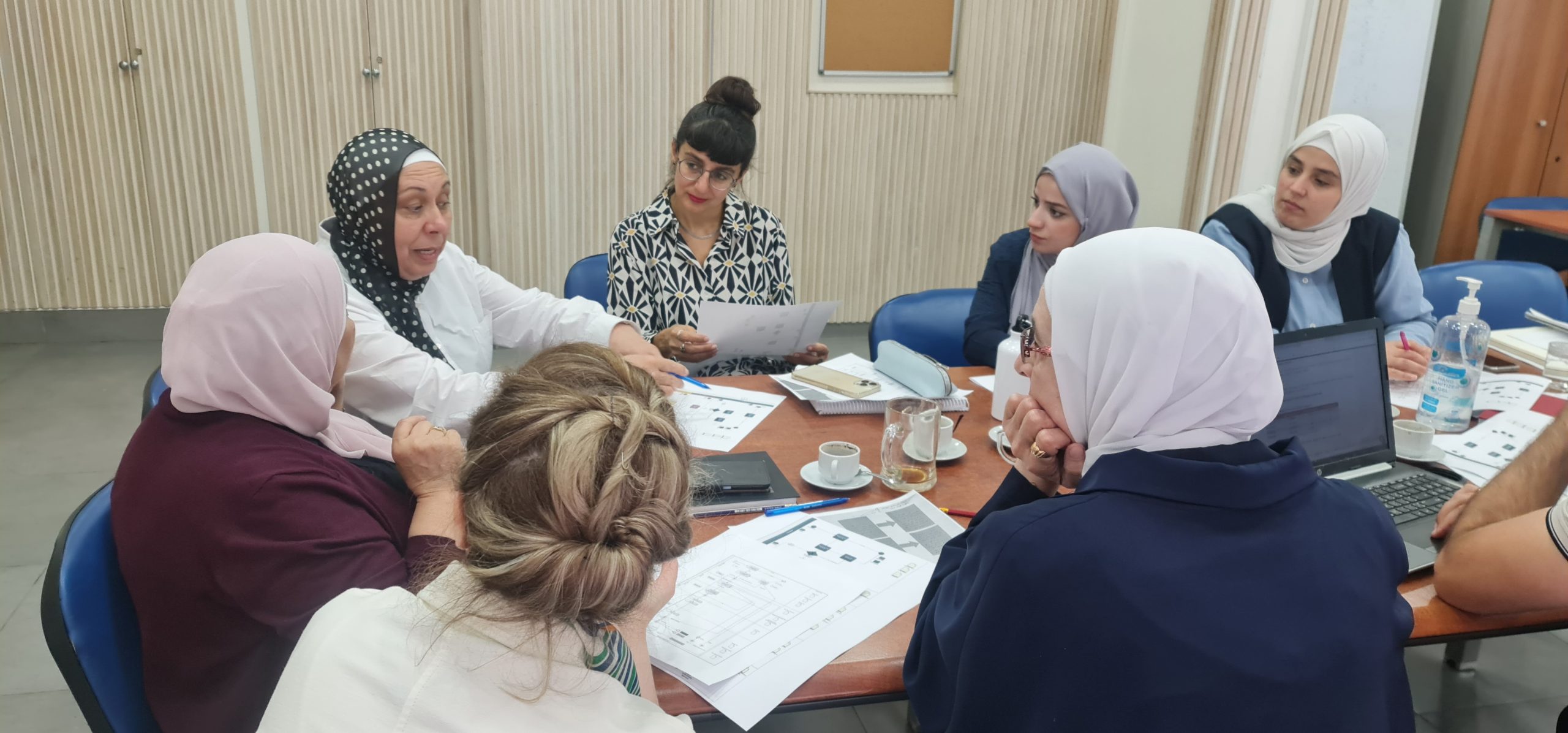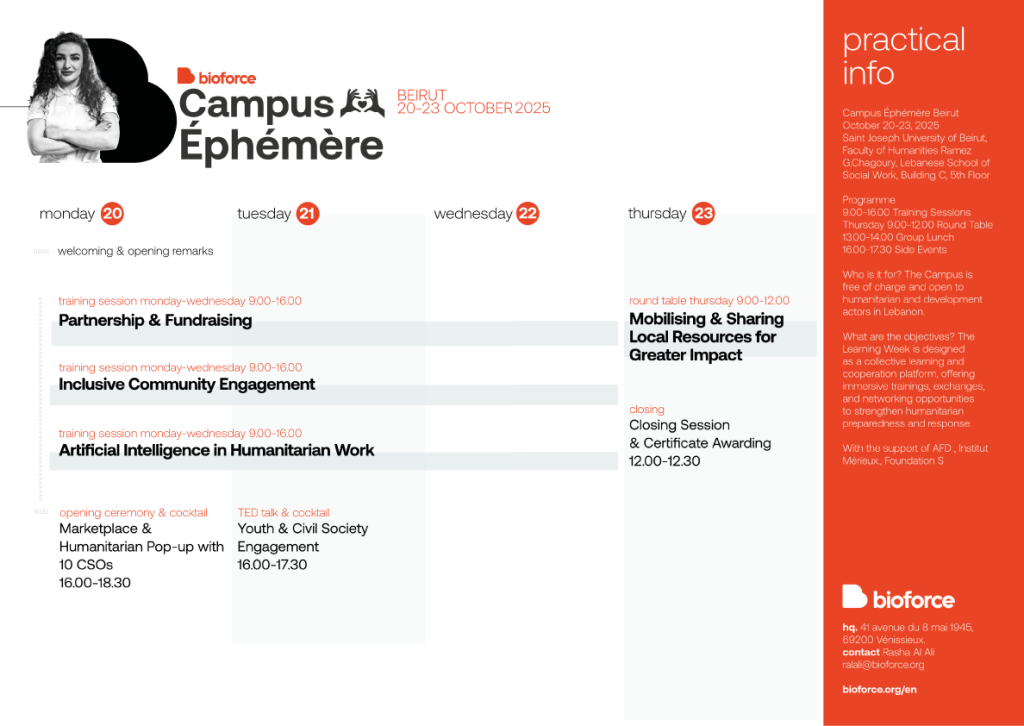
Campus Éphémère Beirut 2025: Building Local Solutions for Global Crises
From October 20 to 23, 2025, Bioforce and the Saint Joseph University of Beirut’s School of Social Work will host the first Campus Éphémère in Lebanon — a week-long event uniting humanitarian and development professionals to strengthen locally led responses to today’s and tomorrow’s crises.
International crises and local impact: how can we prepare?
Since the operationalization of localization-focused humanitarian responses in Lebanon, significant progress has been achieved in reshaping how crises are managed and addressed. Capacity-strengthening initiatives, tailored to crisis-affected areas, have become a key driver in embedding this approach, ensuring that interventions are contextualized and aligned with the needs of affected communities. This evolution enhances the effectiveness, efficiency, and sustainability of humanitarian and development programming.
The Campus Éphémère aims to serve as a collective platform for reflection and dialogue on Lebanon’s increasingly complex and multifaceted crises. Situated at the heart of a fragile and volatile region, Lebanon offers a unique space to share experiences, foster multi-stakeholder engagement, and confront common challenges, ensuring that humanitarian and development action remains accountable to, and guided by, the priorities, vulnerabilities, and aspirations of affected populations.
A week of free trainings and side events
Click on the image to download the programme
The side events
MONDAY – OPENING CONFERENCE: Lebanon at the Heart of the Regional Humanitarian Ecosystem. A shared space for dialogue, connection, and collective reflection.
MONDAY MARKET PLACE & HUMANTIARIAN POP-UP
The Marketplace aims to provide a space for CSOs to showcase their initiatives, exchange good practices, foster networking.
TUESDAY TED talk: YOUTH AND CIVIL SOCIETY ENGAGEMENT
This TED Talk will highlight how young people and CSOs are shaping solutions, fostering dialogue, and contributing to more inclusive and sustainable community responses.
THURSDAY ROUND TABLE: MOBILISING AND SHARING LOCAL RESOURCES FOR GREATER IMPACT
In Lebanon’s context of declining international aid and growing needs, mobilizing and sharing local resources is vital. This round table will explore practical ways for stakeholders to leverage local assets, foster partnerships and locally led response.
Bioforce: preparing for crises here and abroad
Bioforce is an international French organization recognized as a global leader in humanitarian training and capacity strengthening. Since its creation in 1983, Bioforce has been committed to empowering humanitarian and development actors to respond effectively and responsibly to crises.
Each year, more than 3,000 people—both international and national professionals—benefit from Bioforce’s diverse training and support programs. These include diploma courses designed to build a strong pool of skilled humanitarian professionals; short continuing training courses that enhance and broaden professional competencies to meet the evolving challenges of the humanitarian sector; and tailor-made training and support solutions developed to meet the specific needs of organizations and their teams.
Operating across Europe, Africa, and the Middle East, Bioforce works to ensure that every intervention contributes to principled, sustainable, and locally led humanitarian action. Whether preparing tomorrow’s humanitarian workers or supporting those already engaged on the ground, Bioforce helps build skilled, resilient, and accountable actors who make a lasting difference in the lives of vulnerable populations.
School of Social Work (Ecole supérieure de travail social) – Saint Joseph University of Beirut
The School of Social Work (ESTS) is a higher education institution for social work, affiliated with the Faculty of Humanities at the Saint Joseph University of Beirut (USJ). Founded in 1948 under the name of Lebanese School of Social Training and recognized as a “public utility” by the Lebanese State, the School obtained a change of name to School of Social Work on September 1, 2025, by Decree No. 1025. It delivers Bachelor, Master, PhD and Professional diplomas in social work-related fields.
ESTS maintains national-level collaborations with both the public and associative sectors and conducts research on a range of social issues to develop innovative professional practices and contribute to the shaping of national social policies through pilot projects rooted in the Lebanese context.
It also develops international partnerships in the areas of training, research, and action-oriented projects. Since 2024 a joint project with Bioforce was launched to deliver a University Diploma on “Humanitarian Crises, Solidarities and International Cooperation” with the support of the Department of International Cooperation of Monaco’s Government.
A week to collectively build responses to current and future crises
For one week, the Campus Éphémère will bring together humanitarian and development actors to exchange ideas, share experiences, and reflect on Lebanon’s role in the regional ecosystem. The program will include training on partnership and fundraising, inclusive community engagement, and the use of artificial intelligence in humanitarian action, offering participants practical tools and innovative perspectives. Alongside these sessions, side events will create spaces for dialogue on the mobilisation of local resources and the engagement of youth and civil society organizations, highlighting their role as key drivers of locally led change. The Campus Éphémère aims to inspire dialogue, strengthen collaboration, and promote sustainable, community-driven solutions.
When and Where Will It Take Place?
📍 Beirut, Lebanon
Saint Joseph University of Beirut, Faculty of Humanities Ramez G. Chagoury, Lebanese School of Social Work, Campus of Humanities, Building C, 5th Floor
📅 October 20–23, 2025
9.00-16.00 Training Sessions
Thursday 9.00-12.00 Round Table
13.00-14.00 Group Lunch
Starting 16.00 Side Events
This event is organised as part of the REACH project, with funding from the Agence Française de Développement (AFD), Foundation S and Institut Mérieux





